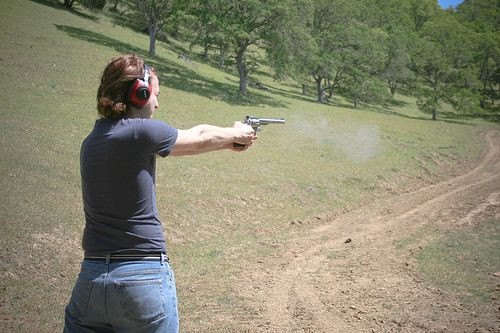Iowa Begins Granting Gun Permits To The Blind: Accommodation For The Disabled Or Public Safety Hazard?

Despite unanimous agreement over the provision’s legality, fellow Iowans and other public health officials are scratching their heads as city lawmakers have begun allowing the blind to obtain gun permits.
The implications of granting gun permits to blind people seem like a no-brainer to both sides of the controversy, as advocates for the provision say blind people should be granted the same rights as the general public in their access to firearms, while opponents argue the case merits special attention due to the potentially lethal costs of a person mishandling the weapon. Under the Americans with Disabilities Act, treating people with disabilities differently is generally prohibited.
"It seems a little strange, but the way the law reads we can't deny them (a permit) just based on that one thing," said Sgt. Jana Abens, a spokeswoman for the Polk County Sheriff's Department.
Officials from Polk County said they have already issued permits to a few people who couldn’t fill out the permit application themselves, due to the fact they couldn’t read it or had considerable trouble reading it. Some permit holders couldn’t legally drive a car. According to executive director of Disability Rights Iowa, Jane Hudson, however, that point is erroneous.
"The fact that you can't drive a car doesn't mean you can't go to a shooting range and see a target," she said. Iowa’s provision, which took effect in 2011, requires training for people interested in obtaining a permit. That permit requires no hands-on training; an online evaluation suffices. The number of people who own a gun and are visually impaired is unknown, as the permit-granting bodies at the county and state level do not keep such statistics.
Chris Danielsen, director of public relations for The National Federation of the Blind, said endowing a blind person with a gun won’t automatically result in accidental death.
"There's no reason solely on the (basis) of blindness that a blind person shouldn't be allowed to carry a weapon," Danielsen said. "Presumably they're going to have enough sense not to use a weapon in a situation where they would endanger other people, just like we would expect other people to have that common sense."
Adding To A National Problem?
In 2011 in the United States, there were 32,163 gun deaths, according to GunPolicy.org. In comparing the U.S. to other countries in terms of total firearm deaths annually, the U.S. ranks first in total deaths ahead of India, which has 6,219 per year, nearly five times fewer deaths than the U.S.
Within the U.S., states are responsible for setting their own laws regarding gun ownership. Like Iowa, Wisconsin carries no visual restrictions for permit applicants. In Nebraska and South Carolina, people must prove their quality of vision, either by providing a valid driver’s license or obtaining permission from their doctor. Illinois requires a range test, though no formal proof of vision.
The National Federation of the Blind doesn’t track states that require vision testing for its permit applicants. Danielsen said Federation members generally disapprove of the practice.
Despite a seemingly clear dichotomy, the problem of gun ownership among the blind is one that has ample gray area, according to Patrick Clancy, superintendent of the Iowa Braille and Sight Saving School, who believes gun ownership may be the sole caveat to the blind fully participating in a sighted world. He also concedes that visual impairment falls on a spectrum, not on one side of the fence or the other.
"Although people who are blind can participate fully in nearly all life's experiences,” he said, “there are some things like the operation of a weapon that may very well be an exception.”
Many Iowa counties are likely to institute special training for those owners who are visually impaired. One Cedar County sheriff, Warren Wethington, said the responsibility falls primarily on the ones doing the training, not the end user.
"If sheriffs spent more time trying to keep guns out of criminals' hands and not people with disabilities, their time would be more productive," Wethington said as he and his soon-to-be 21-year-old daughter, who is legally blind, took turns practice shooting with a semi-automatic handgun.
Sheriffs in neighboring Iowa counties have already issued permits to numerous blind citizens, and among the sheriffs themselves, the debate persists whether visual impairment poses too lofty a barrier for proper training to overcome.
"I'm not an expert in vision," Delaware County Sheriff John LeClere said. "At what point do vision problems have a detrimental effect to fire a firearm? If you see nothing but a blurry mass in front of you, then I would say you probably shouldn't be shooting something."



























